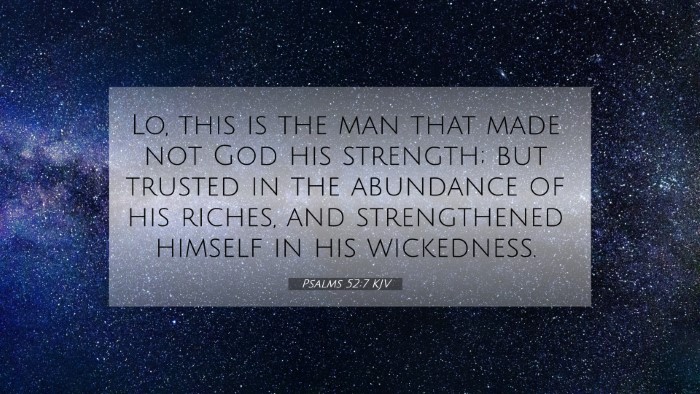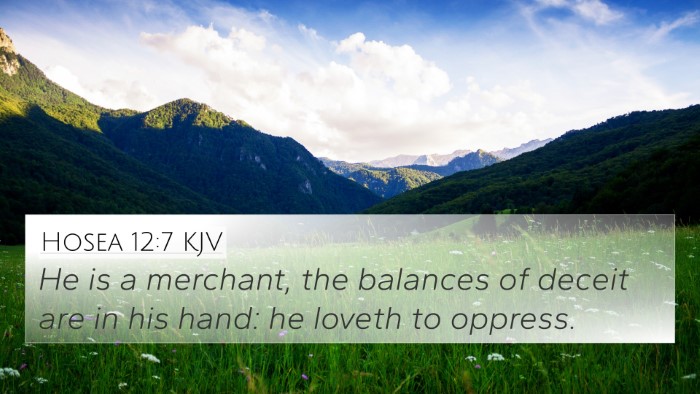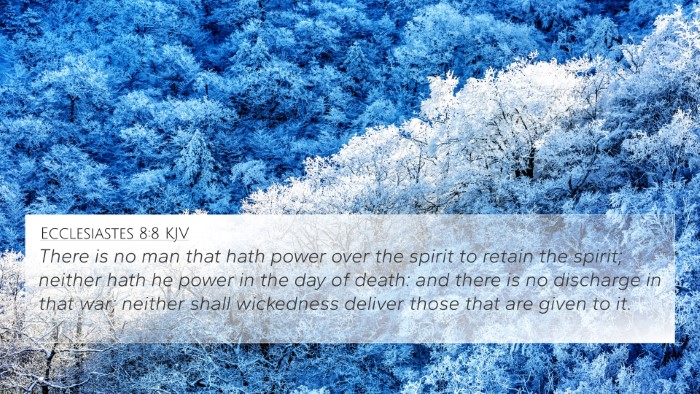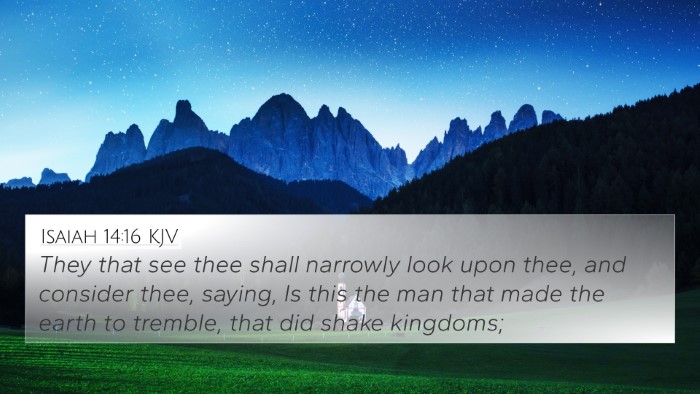Bible Verse Meaning of Psalms 52:7
Psalms 52:7 reads: "Lo, this is the man that made not God his strength; but trusted in the abundance of his riches, and strengthened himself in his wickedness."
This verse stands as a strong condemnation of those who choose material wealth and wickedness over reliance on God. To understand this verse better, we will draw insights from various public domain commentaries.
Insights from Commentaries
- Matthew Henry explains that this verse portrays a contrast between the righteous and the wicked. It highlights the folly of trusting in riches instead of the divine strength that God provides. Henry emphasizes that a true believer relies on God's power and wisdom rather than succumbing to the allure of material wealth.
- Albert Barnes focuses on the phrase "made not God his strength," suggesting that the individual mentioned here has rejected God as his source of strength and guidance. Barnes illustrates the idea that such individuals often find themselves vulnerable and exposed to calamity, as they have built their lives on a shaky foundation of riches and deceit.
- Adam Clarke provides historical context, noting that this verse likely speaks to an individual who thrived through unjust means—linking it to the overall theme of divine retribution against wickedness. Clarke suggests that those who take pride in their earthly gains will eventually face judgment if they fail to seek divine help.
Thematic Connections
This verse resonates with themes of:
- Dependence on God versus self-reliance
- The transient nature of wealth
- The moral and ethical consequences of wicked actions
Bible Verse Cross-References
Several Bible verses resonate with Psalms 52:7, providing profound connections and insights:
- Proverbs 11:28: "He that trusteth in his riches shall fall: but the righteous shall flourish as a branch."
- Psalm 62:10: "Trust not in oppression, and become not vain in robbery: if riches increase, set not your heart upon them."
- Jeremiah 17:5: "Cursed be the man that trusteth in man, and maketh flesh his arm, and whose heart departeth from the Lord."
- Luke 16:13: "No servant can serve two masters: for either he will hate the one, and love the other; or else he will hold to the one, and despise the other. Ye cannot serve God and mammon."
- Matthew 6:19-20: "Lay not up for yourselves treasures upon earth, where moth and rust doth corrupt, and where thieves break through and steal: But lay up for yourselves treasures in heaven..."
- 1 Timothy 6:17: "Charge them that are rich in this world, that they be not highminded, nor trust in uncertain riches, but in the living God, who giveth us richly all things to enjoy."
- James 5:1-3: "Go to now, ye rich men, weep and howl for your miseries that shall come upon you. Your riches are corrupted, and your garments are motheaten."
Understanding and Application
For anyone seeking a deeper understanding of Psalms 52:7, it is clear that the verse serves as a warning against misplaced trust. Rather than relying on wealth and wickedness, individuals are encouraged to seek strength in God. This principle can be applied in various aspects of life, particularly in financial matters, personal integrity, and relational dynamics.
Comparative Bible Verse Analysis
Engaging in a comparative Bible verse analysis helps illuminate the contrast between the righteous and the wicked. By recognizing how these verses link, readers can glean broader biblical truths concerning wealth and righteousness.
Tools for Bible Cross-Referencing
To explore these themes more comprehensively, tools for Bible cross-referencing such as a bible concordance or a bible cross-reference guide can be beneficial. These tools aid in uncovering connections between verses, thus enhancing one’s study of scripture.
Conclusion
Understanding Psalms 52:7 involves recognizing the dangers of relying on material possessions and the wickedness that often accompanies them. Through cross-referencing biblical texts, individuals can forge a deeper understanding of scriptural principles that emphasize the importance of drawing strength from God alone. Engaging with these interconnected themes fosters not only personal growth but also spiritual resilience.














